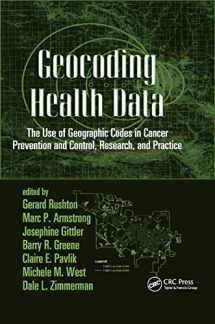
Geocoding Health Data: The Use of Geographic Codes in Cancer Prevention and Control, Research and Practice
Book details
Summary
Description
In the past, disease pattern mapping depended on census tracts based on political units, such as states and counties. However, with the advent of geographic information systems (GIS), researchers can now achieve a new level of precision and flexibility in geographic locating. This emerging technology allows the mapping of many different kinds of geographies, including disease rates in relation to pollution sources.
Geocoding Health Data presents a state-of-the-art discussion on the current technical and administrative developments in geographic information science. In particular, it discusses how geocoded residential addresses can be used to examine the spatial patterns of cancer incidence, staging, survival, and mortality.
The book begins with an introduction of various codes and their uses, including census geographic, health area, and street level codes. It goes on to describe the specific application of geocodes to cancer, detailing methods, materials, and technical issues. The text illustrates how to compile data maps for analysis and addresses issues, such as mismatch correction and data quality. It describes the current state of geocoding practices and discusses the use of individually geocoded cancer incidences in spatial epidemiology, distance estimation and spatial accessibilities, and tips for handling non-geocoded cases. Special consideration is given to privacy and confidentiality issues by focusing on disclosure limitation methods.
With recent disease outbreaks and escalating concerns about bioterrorism, interest in the application of GIS to individual data is growing. The fundamental concepts presented by this book are of great value to anyone trying to understand the causes, prevention, and control of cancer as well as a variety of other diseases.


We would LOVE it if you could help us and other readers by reviewing the book
Book review



